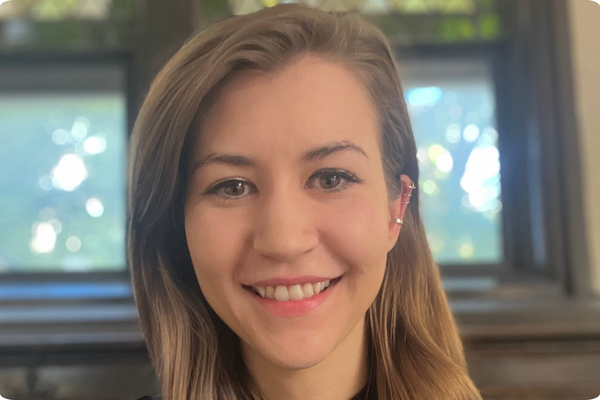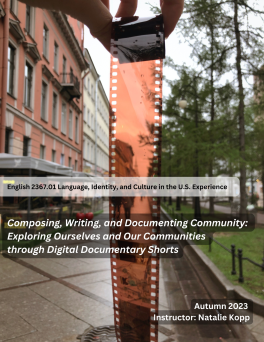Student Spotlight: Natalie Kopp and the art of video storytelling

Natalie Kopp has always had a passion for storytelling and an interest in the various ways stories can be shared. After earning a bachelor's degree in English from St. Olaf College, she worked as a higher education editor, a community college writing consultant and a mentorship program coordinator before joining the English department as a PhD student. Her writing and work experiences inside and outside of the classroom led her to think continually about how we write and how we share writing with others. With a focus on writing studies and digital media, Kopp’s doctoral research explores the ethical implications of nonfiction storytelling, and the powers individuals hold when they write about themselves, others, and their communities.

Video had always intrigued her but also felt intimidating—until she attended the Digital Media and Composition Institute (DMAC), where she learned about video editing and its applications in the classroom. Discovering a new love for the topic, Kopp expanded her training in composition to include this new format and began teaching students how to create videos in English 2269, Digital Media Composing. Her experiences outside and inside of the classroom inspired her to pursue video editing as a mode of storytelling and to design and teach a second-year composition course—a version of English 2367.01, Language, Identity, and Culture in the U.S. Experience—which focuses on students creating research-driven documentary shorts.
Throughout Kopp’s class students partake in traditional research, reading academic journals and news sources. Additionally, they conduct interviews focusing on the communities that matter to them. They then create short video documentaries on their topic instead of a written paper. Kopp’s pedagogical choices connect with her research in investigating the ethics of nonfiction storytelling and the ways students approach topics: she wants students to develop tools to help tell their stories in a new medium while thinking critically and ethically about how to share them. Kopp explains that with these projects, students “walk away from the course feeling invested in their work and see how it matters beyond the classroom.”
As Kopp's familiarity and comfort with video composition has grown, she has continued her connection with DMAC, eventually serving as associate director for three years. During her tenure as associate director she met Michael Blancato, an Ohio State English alum (PhD ‘19), and current director of undergraduate writing at Roosevelt University. Kopp and Blancato discovered a shared interest that led them to collaborate on a research project investigating the effects of multimodal composition on student writing. Their findings suggest that video essays can enhance students' writing skills by fostering critical thinking and narrative construction, and that creating video essays encourages students to articulate their thoughts clearly, use visual elements to support their arguments, and engage with the material more dynamically. The pair recently reported these findings in a joint article, “Want Your Students to Write Better? Assign Video Essays,” published in The Chronicle of Higher Education.
Some might argue that video compositions don’t have a place in writing courses, but Kopp’s personal research has shown otherwise. Outside of her work with Blancato, Kopp has found that students learn the same compositional skills through creating videos as they would in writing traditional essays. In fact, video-specific processes such as storyboarding and timeline editing allow students to strengthen those skills through these creative and experimental processes. Kopp clarifies that she isn’t concerned with the technical aspects of the students’ video, but instead believes that the development of ideas, research and argument are the most important aspects of their video composition, just as they would be in a traditional writing assignment.
Kopp’s research and pedagogy emphasize that storytelling extends beyond the written word. While she doesn’t advocate for video essays to replace traditional essays, she does see them as valuable alternatives for both students and teachers, enriching their narratives and strengthening their skill sets. “I'm a writer at my core and a lover of pen and paper, but I believe we can push ourselves as thinkers, artists, and composers when we experiment with different forms and modes of storytelling.”
